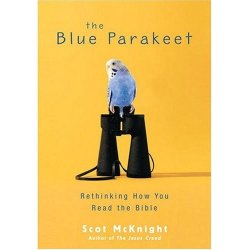
In an earlier post, I outlined the content of Scot McKnight’s new book, The Blue Parakeet: Rethinking how you read the Bible. Here are a few reflections on what I consider the book’s primary strengths and weaknesses.
First the strengths.
There is much about The Blue Parakeet that is praiseworthy. McKnight’s conversation about reading the Bible as story is immensely helpful. I was in college before I learned (in a Bible interpretation class) that the Good Book is really one giant narrative that runs from Genesis to Revelation. That insight changed the way I understood and approached the Scriptures. What McKnight adds to that observation is the idea that each of the 66 books of the canon is a wiki-story – a unique retelling of the metanarrative.
The major benefit of thinking about the Bible in this way is that it forces us to recognize that the later writers (like Paul) are translating and applying the older writers (like Moses). Growing up, I thought of the relationship between the books of the Bible in this way: picture all the authors of the Bible standing on the platform at your church. When Moses finishes his part of the story, he hands the microphone to the writer of Joshua, who talks for a while, passes the mic down the aisle, and so on until Paul takes over the story. If each author is simply giving one part of the whole story, then it gets really confusing when the author’s seem to contradict each other. But if we think of each author as retelling the single, major story from his unique context and perspective, then we get a real sense of the way God’s relationship with his people has developed over time. So Paul doesn’t contradict Moses’ teaching on the Law; he interprets it in the first century.
On a practical level, that gives us great biblical examples of how God’s people have had to reconsider how to live the Bible message in each generation. If you’ve had some exegesis classes and have gotten the sneaking suspicion that Paul would have failed Interp 101, you’ll probably appreciate McKnight’s insights on this point.
The second great aspect of The Blue Parakeet is its consistent emphasis on behavior. McKnight is clearly concerned about how we apply Scripture, and that is evident from the first page to the last. It’s refreshing to read a book about the Bible that isn’t as concerned with explicating every detail as it is with making sure that Christians are equipped to live Christianly. The overall effect this commitment has on the reader is to demystify the interpretation process so that it doesn’t feel like the job of professionals and specialists. McKnight offers a vision of exegesis that makes the Bible accessible to everyone.
I benefited from McKnight’s discussion on reading the Bible as story and his insistence that the reason we read the Bible is so that we can live rightly. He also convinced me of the final (and overarching) point of his book – interpreting a story can be messy business. Because the Bible is not full of rules to retrieve, knowing how to apply it requires discernment. Indeed, none of us is consistent in how we choose what to apply and what to ignore.
In this final section on discernment, the book almost communicates this: we all pick and choose what parts and in what ways we apply the Bible, so let’s just be honest about it. And this is both a strength and a weakness. On the one hand, the author describes several ways Christians have historically discerned appropriate positions on difficult topics – what he calls “patterns of discernment.” And these are helpful. But when all is said and done, I am still unclear about how to apply McKnight’s ideas to other controversial issues.
For example, he models his methodology in the extended treatment of women in ministry at the end of the book. But there he also introduces new variables – Greek exegesis and surveys of Roman texts from the first century – that he doesn’t address anywhere else in his book. Clearly these resources make up an important part of the discernment process. But to know how to incorporate them into McKnight’s overall vision for interpretation on another issue – say, homosexuality in the twenty-first century – I would need to hear him talk more explicitly about them. At the point where his other excellent insights converge, I left needing more to understand exactly how they fit together.
That brings up the issue of audience. Who is this book for? As you might imagine, it is not for people looking for a clear methodology. That’s not necessarily a shortcoming of the book. But it’s something to consider before you read it. It is also probably not best for a brand-new Christian, someone for whom understanding the Bible may already be a problem. In my opinion, there’s not enough here for a new Bible reader to hang her hat on (it might be great, though, if it were paired with another more “how-to” guide on the subject). On other hand, this book would be great for Christians who think they have it all figured out – people who need to have the process problematized. It’s an excellent corrective for those who try to lift a passage out of its context and apply it without discernment in the present. It’s great for people who are inconsistent in their interpretation but don’t recognize it.
We all get lazy in our Bible reading. Scot McKnight holds our feet to the fire and points out our shortcuts, shortcomings, and inconsistencies. That is a much-needed service that makes The Blue Parakeet an excellent contribution to an important conversation.









